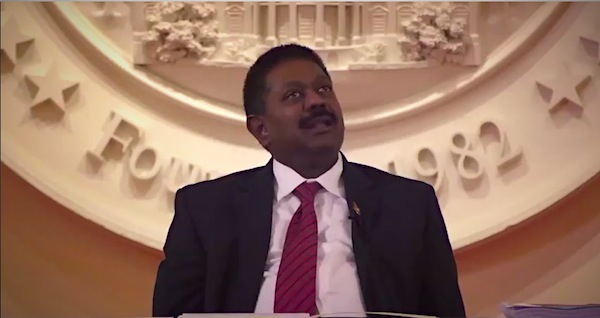Sri Lanka’s Ambassador to the US, Jaliya Wickramasuriya, recently responded to the Crisis Group Report’s assertion that assault on women in Sri Lanka is on the rise. On the one hand, the Ambassador denies the very existence of rape or violence against women in Sri Lanka – “Rapes, this and that not taking any place in Sri Lanka”. On the other hand, he admits that is does exist, by saying that “Like any other country, we have, like couple of cases”. Having thus stumbled his way through with these two contradictory statements, the Ambassador then lists two reasons to support his first assertion. One, that there was no evidence on the increase of violence against women. Two, that Sri Lanka is culturally incomparable because the country has so many women in key positions of authority, it is impossible to think any women are victims of violence. Hence, in his own words, “100% I don’t agree with the report”
The Ambassador however is quick to justify the existence of the ‘couple’ of cases (the ones he first said did not exist) by pointing fingers at the US – “you also have some cases like this”. The logic here seems to be that since its ok and there for you, its ok and there for us too. He then goes on to reassure those listening that “when it comes, the police or whoever will take action against that”. He tellingly trails off in the end with the word “normally”. Perhaps what he means to say is that ‘normally’, the Police would take action against these things, but sometimes, the possibility exists that they won’t.
I don’t understand this. I don’t understand why our diplomats and politicians continue to bristle defensively, refusing to accept fault, scrambling to cover the massive chip on their collective shoulders. How hard can it be to admit one is wrong? How very different would it have been if Ambassador Wickramasuriya had said ‘Yes this is a problem, but we as a nation are committed to ending it’?
Instead, we have the Ambassador proudly list out that Sri Lanka was the first nation to have a female Prime Minister followed by a female President, that Sri Lanka’s current Attorney-General and Chief Justice are both women, that most organisations are run by women and that over 50% of Sri Lanka’s workforce is female. I don’t get how any of this adds up to his assertion that there is no violence or assault against women in Sri Lanka? If the Ambassador was trying to prove that there is no gender discrimination in the island, he is still wrong. For it is a combination of the right political connections, money, class and education that propelled these women forward, not the absence of gender discrimination. The female workforce he speaks of are those that are the most vulnerable to abuse. These are the women that, for work, often have leave behind their children with abusive husbands. These are the women who spend their days hunched over sewing machines earning dollars for their employers and a pittance for themselves. These are the women that spend their days picking tea leaves by hand.
As I noted in a recent article to Groundviews, the assault, abuse, rape and violence against women in Sri Lanka is not restricted to a particular class. It exists everywhere. I know and appreciate those committed to creating platforms and safe spaces to help women educate and empower themselves. But that progress is hampered when the likes of Ambassador Wickramasuriya and those he represents deny the existence of assault, rape and violence against women. Turning a blind eye to those trapped in that viscous cycle – leaving them alone, unrecognised with little or no recourse – it to prolong and worsen their torture. In denying the existence of assault, rape and violence against women, the Ambassador is denying the existence of women like me, who have been abused. His weak argument that the Police or related authorities would take action in the case of such occurrences falls short of being true, for what I experienced with the Police was further discrimination and sneering, not support.
So what exactly is the Ambassador saying? There is no abuse, but there is some abuse, and when there is some abuse, the Police deals with it… normally.
